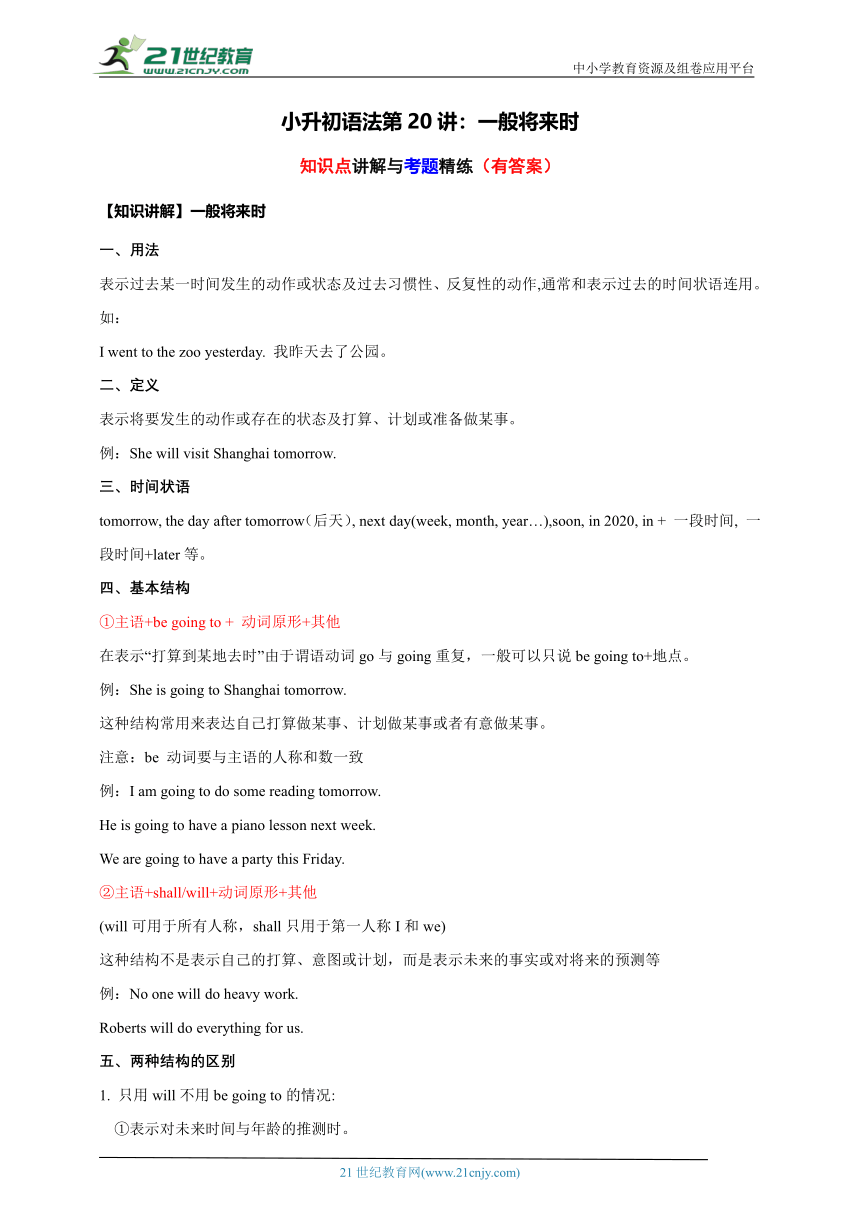
中小学教育资源及组卷应用平台 小升初语法第20讲:一般将来时 知识点讲解与考题精练(有答案) 【知识讲解】一般将来时 用法 表示过去某一时间发生的动作或状态及过去习惯性、反复性的动作,通常和表示过去的时间状语连用。如: I went to the zoo yesterday. 我昨天去了公园。 定义 表示将要发生的动作或存在的状态及打算、计划或准备做某事。 例:She will visit Shanghai tomorrow. 时间状语 tomorrow, the day after tomorrow(后天), next day(week, month, year…),soon, in 2020, in + 一段时间, 一段时间+later等。 基本结构 ①主语+be going to + 动词原形+其他 在表示“打算到某地去时”由于谓语动词go与going重复,一般可以只说be going to+地点。 例:She is going to Shanghai tomorrow. 这种结构常用来表达自己打算做某事、计划做某事或者有意做某事。 注意:be 动词要与主语的人称和数一致 例:I am going to do some reading tomorrow. He is going to have a piano lesson next week. We are going to have a party this Friday. ②主语+shall/will+动词原形+其他 (will可用于所有人称,shall只用于第一人称I和we) 这种结构不是表示自己的打算、意图或计划,而是表示未来的事实或对将来的预测等 例:No one will do heavy work. Roberts will do everything for us. 两种结构的区别 1. 只用will不用be going to的情况: ①表示对未来时间与年龄的推测时。 例:Tomorrow will be Monday. She will be thirteen next year. ②表示必然发生时。 例:Fish will die without water. People will die if all green plants die. 2.只用be going to而不用will的情况: 如果表示已有迹象表明在不久的将来要发生的事情时。 例:Look at those black clouds, It’s going to rain. 现在进行时表将来 某些动词如:go/come/leave/start/begin/arrive等,它们的现在进行时可以表示将来时。 例:They are leaving for Shanghai tomorrow. My brother is coming here soon. 句型转换 (1)变否定句:①在be动词(am, is, are)后加not I’m going to have a picnic this afternoon. → I’m not going to have a picnic this afternoon. ②情态动词shall/will后加not成won’t I will go to London next month. →I will not(won’t) go to London next month. (2)变一般疑问句:①be提到句首,some改为any, and改为or,第一二人称互换。 We are going to go shopping this weekend. → Are you going to go shopping this weekend ②shall/will提到句首,some改为any, and改为or,第一二人称互换。 I will have some lessons tomorrow morning. →Will you have any lessons tomorrow morning (3)变特殊疑问句(对划线部分提问): ①问人用who. I’m going to New York soon. →Who’s going to New York soon ②问干什么用what. My father is going to watch a race with me this afternoon. →What is your father going to do with you this afternoon. ③问什么时候用when. She’s going to go to bed at nine. →When is she going to bed 【考题精练】 改句子。 Nancy is going to go camping.(改否定) Nancy going to go camping. I’ll go and join them.(改否定) I go join them. I’m going to get up at 6:30 tomorrow.(改一般疑问句) to get up at 6:30 tomorrow We will meet at the bus stop at 10:30.(改一般疑问句) meet at the bus stop at 10:30. She is going to listen to music after school.(对划线部分提问) she after school My father and mother are going to see a play the day after ... ...
~~ 您好,已阅读到文档的结尾了 ~~